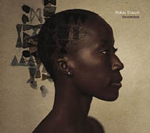Home » Jazz Articles » Album Review » Rokia Traor: Bowmbo
Rokia Traor: Bowmbo
Who dares say that Mali has nothing to offer?
Come with me, come discover the land of my ancestors.
Where ancient ancestral links forged with humor and respect.
But as a diplomat's daughter she moved between Mali's capital, Bamako, the Middle East, Africa, and Europe, and she now lives in Paris. She uses West African indigenous acoustic instruments, but she feels at home when backed by the Kronos Quartet. Traoré portrays herself as an worldly, cosmopolitan woman who addresses relationships—personal, cultural, and even global—with natural authority when she sings on the one of the disc's most arresting songs, "Kèlè Mandi":
I bring what makes me different to you,
Give me a bit of what you are,
But do it with gentleness and tolerance,
Since all that you impose upon me with force
Will only leave the imprint of
Your violence and your arrogance
Traoré's words and imagery offer insight on social conscience and maturity. On "Mariama" she laments the death of Mariama Kaba and humbly sings:
We arrive with empty hands,
And the day we leave,
We go the same way.
Even our bodies are only on loan,
They age, obeying the inexorable laws of time,
And when their time comes, they feed the worms.
Bowmboï is Traoré's most accomplished recording to date, after Mouneïssa (Indigo, 1998) and Wanita (Indigo, 2000). It's much more refined, vocally and musically. Her arrangements of the ten songs on this disc are sparse, focusing on her delicate and lulling vocals, usually backed by female vocalists who solidify Traoré's fragile delivery.
She contrasts her tone with the coarse vocals of Malian singer Ousmane Sacko on "Mariama," and on "Manian" and "Déli" she experiments with multitracking her voice to great effect. The n'goni, the West African hunter's harp, is the main instrument, and most of the songs feature two n'goni players, who also dictate the rhythm of the songs.
The two most astounding tracks are the collaborations with the Kronos Quartet. On the minimal "Manian," her multi-tracked vocals add a repetitive motif, as if the piece was composed by an African twin of Phillip Glass. The title track that closes this recording is a haunting slow piece that asks for more collaborations—or a second volume of Kronos Quartet's Pieces Of Africa (Nonesuch, 1992).
Traoré offers a beautiful global vision that combines past, present, and future, tradition and innovation, African and non-African elements—from a compassionate and confident feminine perspective. Warmly recommended.
Track Listing
M'Bifo; Sara; K?'t
Personnel
Djibril Camara: bolon (6); Sidiki Camara: percussion (2,3,9); Alou Coulibaly: percussion (3,4,7); Mamah Diabat
Album information
Title: Bowmbo | Year Released: 2005 | Record Label: Nonesuch Records
< Previous
A Blanket of Blue
Next >
Arothymian
Comments
Tags
For the Love of Jazz
 All About Jazz has been a pillar of jazz since 1995, championing it as an art form and, more importantly, supporting the musicians who create it. Our enduring commitment has made "AAJ" one of the most culturally important websites of its kind, read by hundreds of thousands of fans, musicians and industry figures every month.
All About Jazz has been a pillar of jazz since 1995, championing it as an art form and, more importantly, supporting the musicians who create it. Our enduring commitment has made "AAJ" one of the most culturally important websites of its kind, read by hundreds of thousands of fans, musicians and industry figures every month.



















